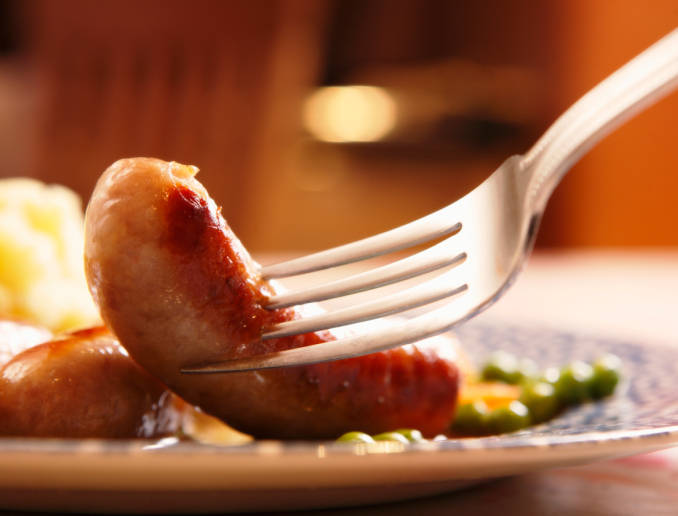
Plus recent reports have linked the eating of large amounts of processed meat products like sausages to increased rates of bowel cancer and stomach cancer.
Although this news may at first appear alarming, there is no reason to cut out the sausages completely, it just means we have to shop smarter and be more aware of the ingredients which are in the sausages we are eating.
Problems with Commercial Sausages
The main problem with many shop bought sausages is that they contain very little actual meat, and are packed with fillers and fat to give them flavour and bulk them out. The meat which is used to make the sausages is very poor quality and is from the cuts which cannot be used for any other purpose.
The meat is then minced beyond all recognition and put into plastic skins. Australia has standards laid down for what should be in a sausage, and the minimum standard is 50g per 100g of lean meat, and although lots of sausages meet this standard, there is huge variation in the amount of meat contained in the products.
Commercially bought sausages are also often high in salt and fat. If buying sausages in the supermarket, it is therefore vital to take time to read the label and make sure you are buying the best sausages available.
Smaller producers
Although it is not always the case, smaller producers and farm shops generally make better quality sausages than you can buy mass produced in the supermarket. It goes without saying that the higher the meat percentage, the better the sausage, but the very best sausages are made with very lean meat from animals like deer, chickens or kangaroo.
Smaller companies or individual producers are more likely to be open and honest about their products and be able to advise on which sausages are best for a healthy eating regime.
Alternatives
We traditionally associate sausages with beef, lamb or pork, but a good healthy alternative to sausages made with meat products is a vegetarian sausage. The meat content in a traditional sausage is replaced by pulses and beans such as lentils and kidney beans, and as these foods are high in fibre and protein, they will keep hunger at bay and often provide more vitamins and minerals than the meat based sausages we are more familiar with.
Substituting veggie sausages for the meat version every other meal will drastically decrease the risk of bowel cancer and other health risks associated with the over consumption of processed meats.
Making Your Own
The only way to ensure you know exactly what is going into your sausages is to make them yourself. It’s not as difficult as it sounds, and the equipment needed can be easily sourced online. A meat mincer with sausage attachment can cost as little as $65, and casings for sausages are equally good value.
When making your own sausages you can tailor your flavourings to personal tastes, adding herbs and chilli, or more unusual flavourings such as honey, fruit and nuts. Always use a good quality, lean meat to form the base of the sausage and this will guarantee a healthy and tasty end product.
Making sausages is something the kids will love, and allowing them to get involved with the preparation and decisions about what to put in the sausages will raise both their interest in cooking and nutrition, and make them more likely to eat the sausages if they have had a hand in making them too.
To see our 28 Day Diet & Exercise Plan click here
